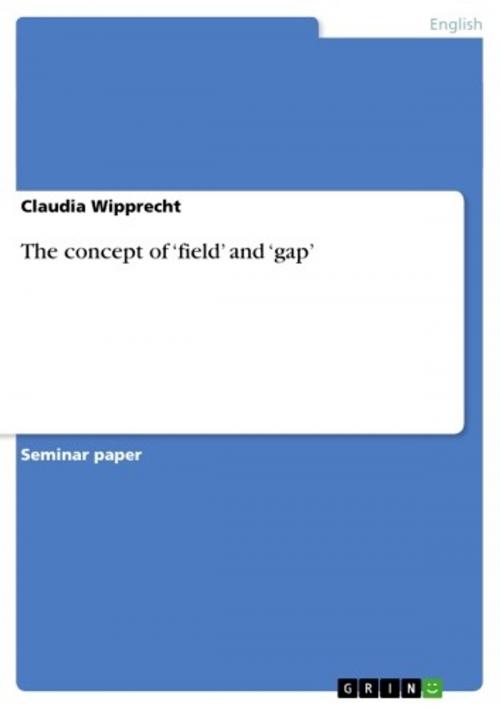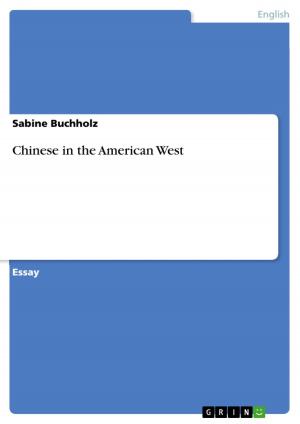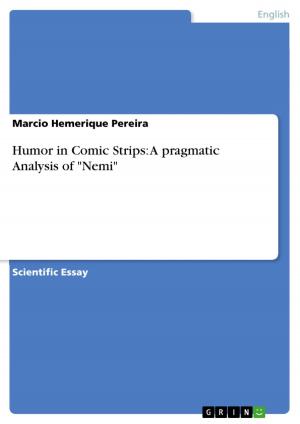| Author: | Claudia Wipprecht | ISBN: | 9783638812764 |
| Publisher: | GRIN Publishing | Publication: | June 13, 2007 |
| Imprint: | GRIN Publishing | Language: | English |
| Author: | Claudia Wipprecht |
| ISBN: | 9783638812764 |
| Publisher: | GRIN Publishing |
| Publication: | June 13, 2007 |
| Imprint: | GRIN Publishing |
| Language: | English |
Seminar paper from the year 2005 in the subject English Language and Literature Studies - Linguistics, grade: 2,3, University of Erfurt (Philosophische Fakultät), course: Contrastive Linguistics English - German, 30 entries in the bibliography, language: English, abstract: The starting point of my research paper on field theory and gaps is the question: what are the different interpretations of 'field' in our language nowadays. I started with dictionaries and went on with encyclopedias. According to the German dictionary 'Duden' (Duden (2000: 370)) a field may be e.g. an electric field. This shows that this word may be lexical ambiguous. There can also be found some word combinations with 'field', e.g. cross-country, 'ins Feld (in den Krieg) ziehen' or field crop. This example shows that there is no one-to-one correspondence in English for 'ins Feld ziehen'. A non-native speaker has to paraphrase this expression, e.g. 'go to war'. However, these notions are rather primary. In order to find a more precise kind of definition, I searched the 'Wikipedia' (http://wikipedia.org/wiki/Feld (access: 2005-08-02, 12:14 MEZ)) and found a very detailed description of the term 'field': it can represent an acre (differentiated land area to grow agricultural crop), in sports the field to play on or a certain group of pursuers, in military history the theater of war, in general a specific field, in physics a certain position, in computer science a data structure, in cutting the term for a single picture, and in a specific area of heraldry the term for the parts of a crest. By looking up 'field' in the online dictionary 'Wiktionary' (http://de.wiktionary.org/wiki/Feld (access: 2005-08-02, 20:22 MEZ)), I discovered nearly the same definition as in the 'Wikipedia', but there were two pieces of extra information about 'field': it may be a defined as an area on a sheet of paper, a board to play on, or a screen, but it can as well depict the world outside of a laboratory.
Seminar paper from the year 2005 in the subject English Language and Literature Studies - Linguistics, grade: 2,3, University of Erfurt (Philosophische Fakultät), course: Contrastive Linguistics English - German, 30 entries in the bibliography, language: English, abstract: The starting point of my research paper on field theory and gaps is the question: what are the different interpretations of 'field' in our language nowadays. I started with dictionaries and went on with encyclopedias. According to the German dictionary 'Duden' (Duden (2000: 370)) a field may be e.g. an electric field. This shows that this word may be lexical ambiguous. There can also be found some word combinations with 'field', e.g. cross-country, 'ins Feld (in den Krieg) ziehen' or field crop. This example shows that there is no one-to-one correspondence in English for 'ins Feld ziehen'. A non-native speaker has to paraphrase this expression, e.g. 'go to war'. However, these notions are rather primary. In order to find a more precise kind of definition, I searched the 'Wikipedia' (http://wikipedia.org/wiki/Feld (access: 2005-08-02, 12:14 MEZ)) and found a very detailed description of the term 'field': it can represent an acre (differentiated land area to grow agricultural crop), in sports the field to play on or a certain group of pursuers, in military history the theater of war, in general a specific field, in physics a certain position, in computer science a data structure, in cutting the term for a single picture, and in a specific area of heraldry the term for the parts of a crest. By looking up 'field' in the online dictionary 'Wiktionary' (http://de.wiktionary.org/wiki/Feld (access: 2005-08-02, 20:22 MEZ)), I discovered nearly the same definition as in the 'Wikipedia', but there were two pieces of extra information about 'field': it may be a defined as an area on a sheet of paper, a board to play on, or a screen, but it can as well depict the world outside of a laboratory.















